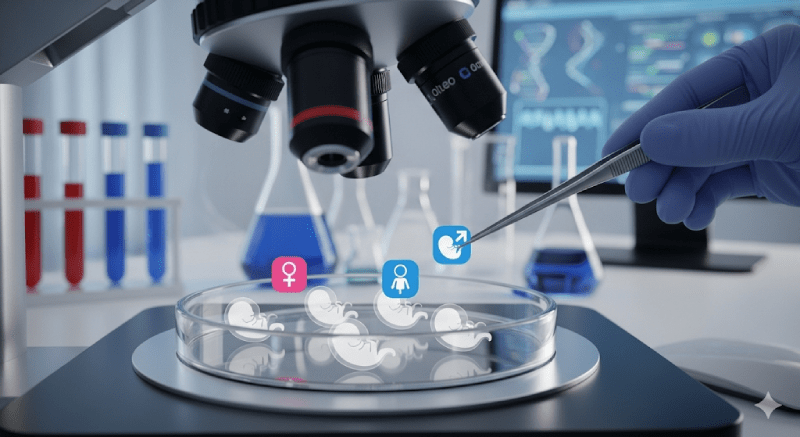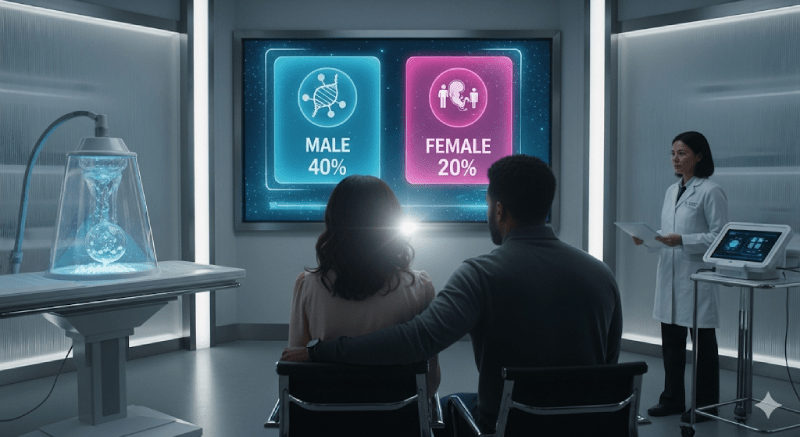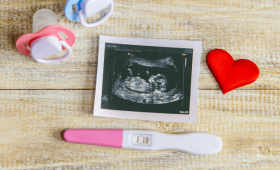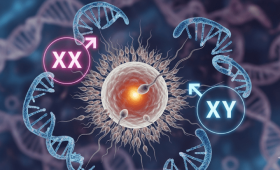Is IVF Treatment with Gender Selection Possible in Turkey?
According to legal regulations in Turkey, it is absolutely forbidden to select the gender of an embryo as part of IVF treatment, and this procedure cannot be performed in any clinic. This rule has been established for ethical and medical reasons and applies to both local and foreign patients. Turkish authorities strictly enforce regulations on this matter. Patients are clearly informed that they must not make such requests and must comply with this ban. Illegal attempts can lead to serious consequences.
Can Foreign Patients Have Gender Selection in Turkey?
Gender selection is not legal for foreign patients in Turkey either. IVF clinics in Turkey treat all their patients equally and are obligated to comply with the law. Therefore, no matter which country you are from, gender selection is not possible in Turkey. Foreign patients usually prefer to go to other countries for this procedure due to legal restrictions in their own countries. Turkish clinics also clearly state these legal restrictions and alternatives to their patients.
What is the Main Reason Why Gender Selection is Banned in Turkey?
The main reason why gender selection is banned in Turkey is ethical and religious beliefs. Gender selection can be seen as an intervention in the balance of nature and can potentially lead to social imbalances. Therefore, legal regulations have forbidden gender selection except for medical necessities (for example, the transmission of genetic diseases linked to a specific gender). This law aims to protect both ethical values and moral principles.
Can Gender Selection in Turkey Only Be Done for Genetic Diseases?
Yes, in Turkey, gender selection in IVF treatment can only be done to prevent the transmission of sex-linked genetic diseases. For example, if there is a risk of a disease like hemophilia, which is only seen in male children, the family may request the transfer of a healthy female embryo. This is performed using a method called ‘preimplantation genetic diagnosis (PGD)’ and is strictly a medical necessity, not an aesthetic preference.
What Methods Are Used for IVF Treatment in Turkey?
Turkey is quite advanced and implements modern methods for IVF treatment. These methods include; intracytoplasmic sperm injection (ICSI), blastocyst transfer, assisted hatching, and preimplantation genetic diagnosis (PGD). All these methods are used to increase the patient’s chance of pregnancy. Each method is determined by doctors based on the patient’s specific condition and is included in the treatment plan.
Which Countries Are Preferred for Gender Selection Treatment?
Since gender selection is not legal in Turkey, couples who want to have this procedure usually turn to countries where it is legal. The Turkish Republic of Northern Cyprus (TRNC), the United States, and some European countries are at the top of this list. In these countries, gender selection is carried out within the framework of legal regulations and ethical rules. This is an important factor affecting international medical tourism.
Are There Any Centers in Turkey That Perform Gender Selection?
There are no centers in Turkey that legally perform gender selection. If you encounter a center that claims to perform this procedure, you should know that this center is operating illegally. Such illegal procedures carry risks for both patient health and legal issues. Therefore, it is of great importance for couples seeking treatment to be careful and prefer centers that comply with the law.
Why is Gender Selection Possible in Cyprus?
In the Turkish Republic of Northern Cyprus (TRNC), gender selection has been legally allowed. This has made the country an important hub in the field of medical tourism. Thanks to its legal regulations in this area, Cyprus allows for gender selection for both medical necessities and individual preferences. Clinics in Cyprus provide services at international standards with high-tech laboratories and experienced specialists.
Is It Safe to Go to Cyprus for Gender Selection?
Cyprus is one of the safest countries to go to for gender selection. The clinics in the country are supervised by legal regulations and may have international accreditations. Experienced medical tourism agencies like Cure Holiday organize this process from start to finish, ensuring that patients have a safe and comfortable treatment experience. This also helps patients act within legal and ethical boundaries.
How Does the Treatment Process in Cyprus Work Through Cure Holiday?
Cure Holiday manages the entire process for patients who want to receive IVF treatment with gender selection in Cyprus. First, the patient’s medical history is evaluated, and their suitability for treatment is determined. Then, travel and accommodation plans are made. During the treatment, the patient is supported by both the clinic’s staff and Cure Holiday’s consultants. The entire process, including post-treatment check-ups, is meticulously followed. This helps patients complete the process with minimal stress.
How Does the Cost of Gender Selection in Cyprus Compare to Turkey?
Since gender selection is not legal in Turkey, it is not possible to make a cost comparison. However, IVF treatment with gender selection in Cyprus is more affordable than in other European countries or the USA. Prices vary depending on the quality of the clinic, the additional methods used, and the package content. Cure Holiday offers treatment packages that suit their patients’ budgets, making the costs more transparent.
What Technologies Do Clinics in Cyprus Use?
IVF clinics in Cyprus use the latest technological equipment. Their embryo laboratories are equipped with advanced technology such as PGT-A (aneuploidy screening) and modern genetic tests, embryoscope systems, and laser technologies. This technological infrastructure is critical to increasing treatment success and ensuring the selection of the healthiest embryos.
What is the Success Rate of Gender Selection in Cyprus?
The success rate of gender selection treatment in Cyprus is similar to general IVF success rates and is over 99% with the PGT method. However, this success rate varies depending on many factors such as the patient’s age, general health status, and embryo quality. The success rate is higher in young and healthy patients. Agencies like Cure Holiday aim to optimize this success rate by directing patients to the most suitable clinics and specialists.
How Many Days Does the IVF Treatment with Gender Selection Take?
IVF treatment with gender selection is generally a process of 2-3 weeks. The first stage of treatment, the egg growth process, usually begins in the patient’s home country. The patient comes to Cyprus for the stages of egg retrieval, fertilization, and embryo transfer. This process can take an average of 10-14 days in Cyprus. During this time, patients both receive their treatment and have the opportunity to rest and vacation.
How is the Travel Plan Made for the Treatment?
Cure Holiday manages all stages of travel planning for the treatment. The agency plans logistical details such as flight reservations, accommodation arrangements, and airport transfers for patients. This allows patients to focus on the treatment and eliminates travel-related stress.

What Documents Are Required for Gender Selection Treatment?
The documents required for gender selection treatment vary according to the patient’s medical history and the clinic’s requirements. Generally, documents such as identity cards, marriage certificates, previous medical reports, test results, and ultrasound images are requested. Cure Holiday’s consultants guide patients on how to collect and correctly prepare these documents.
Is It Easy to Travel from Turkey to Cyprus for Treatment?
Traveling from Turkey to Cyprus for treatment is quite easy. There are direct flights from major cities like Istanbul, Ankara, and Izmir. The travel time is quite short, and a visa is not required. This allows patients to reach the treatment center easily and quickly.
Is There an Age Limit for Gender Selection Treatment?
While there is no legal age limit for IVF treatment with gender selection, most clinics perform a comprehensive evaluation of women over 45 before starting treatment. This age limit is based on medical reasons such as a decrease in the success rate and an increase in pregnancy risks. The patient’s age directly affects the treatment plan and embryo selection.
How is the PGT Method Applied and Why is It Important?
Preimplantation Genetic Diagnosis (PGD) is the examination of the genetic structure of embryos by taking a very small cell sample from them. This method allows for the determination of both genetic diseases and the gender of the embryo. The transfer of only genetically healthy embryos of the desired gender increases the chance of pregnancy and the likelihood of having a healthy baby. PGT is the most critical stage of the gender selection process.
Is Gender Selection Treatment Ethically and Religiously Controversial?
Gender selection is a controversial topic from a religious and ethical perspective. Some religions and belief systems see this practice as an intervention in the natural process, while others state that it can be acceptable in certain situations (such as genetic disease). Although this topic is controversial, it is performed in Cyprus within a legal framework and under the supervision of medical authorities.
How Long is the Pre-Treatment Preparation Process?
The pre-treatment preparation process varies depending on the patient’s health status. It usually consists of hormone therapies, ovarian stimulation, and regular check-ups. This process can take an average of 10-12 days and can be started under the supervision of a gynecologist in the patient’s home country. This preparation period is vital for the success of the treatment.
Can Gender Selection Be Attempted More Than Once?
Yes, if the first attempt is not successful, gender selection can be attempted again. Success rates may increase with each attempt. The decision to continue treatment depends on the patient’s general health, age, and embryo reserve.
Is There a Difference in Success Rates for Selecting a Boy or a Girl?
Since the PGT method is used for both boy and girl selection, there is no significant difference in success rates. The selection and transfer of healthy embryos of both genders increase the success rate. However, since each patient’s genetic structure and embryo quality are different, the results are personalized.
What Are the Possible Side Effects During the Treatment Process?
The side effects that can be experienced during IVF treatment can be related to hormone therapies. These may include slight bloating, abdominal pain, breast tenderness, and mood swings. These side effects are usually mild and disappear after the treatment is over.
Is There a Waiting Period for Gender Selection Treatment?
There are usually no long waiting periods for gender selection treatment. After the patient’s medical evaluation is done, treatment can be started as soon as possible. This allows patients to access treatment quickly and prevents loss of time.
Is the Health of IVF Babies with Gender Selection Different from Normal Babies?
IVF babies with gender selection are as healthy as babies born naturally. Since the embryos selected with the PGT method are genetically healthy, the risk of congenital genetic diseases is lower. This provides genetic assurance for families.
How Long Does It Take to Return to Normal Life After Treatment?
The return to normal life after treatment is usually very fast. After the embryo transfer, patients can return to their normal daily activities after a few days of rest. It is important to avoid physically strenuous activities and follow the doctor’s recommendations.
Is It Possible to Transfer More Than One Embryo?
Within the legal regulations in Cyprus, more than one embryo can be transferred. Transferring multiple embryos to increase the chance of twin or triplet pregnancies is a common practice. However, the risks of this situation (such as premature birth, low birth weight) are explained in detail to the patient, and the decision is made jointly between the patient and the doctor.
Is My Spouse’s Consent Required for Gender Selection Treatment?
Yes, according to legal regulations in Cyprus, the written consent of both spouses is required for IVF treatment and gender selection. This is a mandatory practice from both a legal and ethical perspective.
What Tests Should I Have Before Starting Treatment?
Before starting treatment, comprehensive tests are performed for both the male and female. For the woman, hormonal tests, ultrasound, and a hysterosalpingogram are requested, and for the man, a sperm analysis is requested. The results of these tests play a critical role in creating the treatment plan and increasing the success rate.



